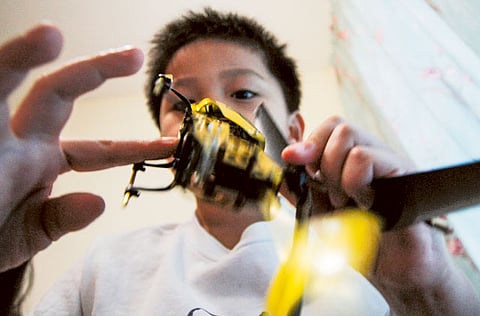Dilemma remains for parents of boy expelled from school in Dubai
Expert advises schools to have clear admission policies after boy is expelled from school

Dubai: Barely a month before classes start this September, the parents of a four-year-old boy who was expelled from a preparatory summer class in July reportedly due to hyperactivity are still facing a dilemma regarding their only son’s future.
Rommel Liwanag, 47, brought his son Miggy (not his real name) to Dubai three months ago so they could live together as a family. Miggy was admitted in a preparatory summer class in a school in Al Ghusais in July. But two days after classes began, he was expelled due to ‘behavioural incapacities.’
“If he does not get accepted in any school here, I’ll be forced to resign from my job and come home so he can go to school in the Philippines,” Liwanag, a hotelier, told Gulf News. Liwanag said that he had already contacted several schools, including Al Noor Training Centre, to check whether they could accommodate his son properly.
“This is demoralising for the parent and for the child. And the parent will try to find some place else who can entertain their child. So they go over there and the cycle repeats, unfortunately,” Dr. Muhammad Tahir, a general / child and adolescent psychiatrist, told Gulf News.
Dr. Tahir advised that parents should seek medical help right away should they notice something ‘odd’ with their child’s behaviour.
“Just ignoring [your child’s condition] is not gonna work. In this kind of situation, I suggest to the parent they should seek psychiatric help, have the full evaluation done and then psychiatrists can communicate with the school,” Dr. Tahir said.
A simple Attention Deficit Hyperactivity Disorder (ADHD), where a chemical imbalance in the brain causes a child to lack focus, be super active, and become difficult to control, is actually treatable with medication and behavioural modification according to Dr. Tahir. Hence, there is hope for parents with hyperactive children.
Dr. Tahir emphasised on the importance of having trained psychologists in schools to do proper screening for children, Formulating clear admission policies regarding children with special needs is of utmost importance as any wrong move could have severe consequences to the child.
In July, Miggy was kicked out of the summer programme two days after it opened as he reportedly could not behave himself and just kept roaming around the classroom.
“It’s much better to not to admit the child beforehand, rather than making a panic call to the parents one or two days later because that can be demoralising for the parents, for the child and for the family,” Dr. Tahir said.
Repeatedly getting rejected may cause the child to harbour negative feelings toward himself or to other people.
“That can develop into a negative interaction. The child learns the environment around him is hostile, it’s not helpful to him. And he assumes everything is hostile,” Dr Tahir said.
Sign up for the Daily Briefing
Get the latest news and updates straight to your inbox



